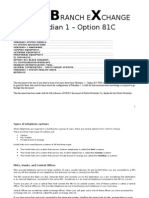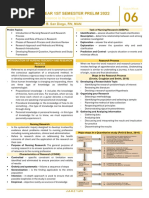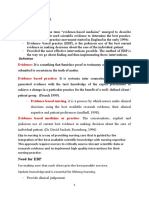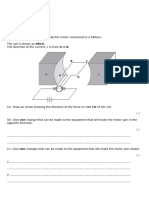Research Notes 1
Uploaded by
Myangel LoiseResearch Notes 1
Uploaded by
Myangel LoiseMODULE 1
NCM 112 Nursing Research 1
September 4, 2020
I. SECTION 1: Introduction to Nursing • Assume a major role (as primary investigator) in
Research conducting research and contributing to the empirical
RESEARCH knowledge generated in a selected area of study.
- To ‘search again’ • Obtain initial funding for research; application of
- In some cases, to search again, and again, and again to research grants.
the nth power. • Coordinate research teams of BSN, MSN, and DNP
➢ RESEARCH WITHIN A CONTEXT OF A nurses
PROFESSION Postdoctoral
o Involves the scientific process • Implement a funded research program of research.
o A systemic inquiry to solve problems and • Lead and/or participate in nursing and interdisciplinary
answer questions to further enhance the research teams.
profession • Identified as experts in their areas of research/
• Mentor PhD-prepared researchers.
NURSING RESEARCH
- Is a diligent, systematic inquiry designed to develop
knowledge about issues of importance to nurses,
including nursing practice, nursing education, and
nursing administration/service
WHAT IS THE OUTCOME/PRODUCT OF
RESEARCH?
Knowledge!!
EVIDENCE-BASED PRACTICE
- Conscientious use of current best evidence in making
decisions about patient care (Sackett, 2000).
- A process involves rigorous critical appraisal, including
synthesis and recommendation of practice of a body of
SOURCES OF EVIDENCE FOR NURSING
evidence comprised of MULTIPLE STUDIES and PRACTICE
combines it with CLINICIAN EXPERTISE as well as 1. Tradition
PATIENT/FAMILY PREFERENCES & VALUES to make • Are based on untested traditions, customs, and “unit
the best decision about patient care culture” rather on sound evidence.
• “Scared Cows” or ineffective traditional habits.
ROLES OF NURSES IN RESEARCH • Transferred to the present by written and verbal
Consumer of Research -------------→ Product of Research communication and role-modeling and continued
1. Contribute an idea for a clinical inquiry. influence the present practice of nursing.
2. Assist in collecting research information 2. Authority
3. Offer advise to clients participating in a study • Is a person with expertise and power who is able to
4. Search for research evidence influence opinion and behavior.
5. Discuss the implications of a study in a journal • Knowledge acquired from authority is illustrated
club when one person credits another person as the
source of information.
The Research Role a nurse assumes usually EXPANDS • Knowledge acquired from authorities sometimes
with his or her advanced education, expertise, and career has not been validated through research and is not
path. considered the best evidence for practice.
3. Trial and Error
RESEARCH EXPECTATIONS & COMPETENCIES • Is an approach with unknown outcome that is used
BSN in a situation of uncertainty when other sources of
• Have knowledge of the research process and skills in knowledge are unavailable.
reading and critically appraising studies. • Can be time consuming because multiple
• Assist in the implementation of EBP guidelines, interventions might be implemented before one is
protocols, algorithms and policies in practice with found to be effective; also not cost-effective
guidance. • Can be practical but the methods tend to be
• Assist with problem identification and data collection. haphazard and solutions may be idiosyncratic.
MSN 4. Personal Clinical Experience
• Enables one to gain skills and expertise by providing
• Master of Science in Nursing (MSN) have undergone the
care to patients and families in clinical settings.
educational preparation to critically appraise and
synthesize findings from studies to revise or develop • Has limitations because each nurse’s experience is
protocols, algorithms, or policies use in practice. too narrow to be generally useful, and personal
experience are often colored with biases.
• Implement best research evidence in practice
• Collaborate in research projects and provide clinical
5. Assembled information
expertise for research with other nurse scientists • Benchmarking data from local, national, and
international sources
DNP • Quality improvement and risk data such as
• Doctor of Nursing Practice (DNP) practice-focused medication and error reports, can be used to assess
• Participate in evidence-based guideline development practices and determine the need for practice
• Develop, implement, evaluate, and revise as needed changes.
protocols, policies, and evidence-based guideline in • Offer useful information but provide no mechanism
practice actually guide improvements.
• Conduct clinical studies, usually in collaboration with 6. Disciplined Research
other nurse researchers • Best method of acquiring reliable knowledge
PhD • Evidence-based health care practice compels nurses
• Doctor of Philosophy in Nursing (research-focused) to base their clinical practice on rigorous research-
based findings
Chrisyll Anne Dominguez BSN 3A
PARADIGMS AND METHODS FOR NURSING
RESEARCH
• Paradigm is a worldview, general perspective on the
world’s complexities.
o 2 Major paradigms governing the discipline
of nursing research
▪ Positivist Paradigm
▪ Constructivist/Naturalistic
Paradigm
• Assumption is a principle that is believed to be true
without verification.
o Types
▪ Nature of Reality
▪ Relationship between researcher
and those being researched
▪ The role of values in the inquiry
▪ Best methods for obtaining
evidence
*refer to the video for the table
PURPOSES OF NURSING RESEARCH TO
ACHIEVE VARYING LEVELS OF EXPECTATION
➢ Identification
➢ Description
➢ Exploration
➢ Prediction and Control
➢ Explanation
*refer to the video for the table
RESEARCH PURPOSES LINKED TO EVIDENCE-
BASED PRACTICE AND KEY RESEARCH
QUESTIONS
➢ Therapy/Intervention
➢ Diagnosis/Assessment
➢ Prognosis
➢ Etiology/Cause/Harm
➢ Meaning/Process
LEVELS OF EVIDENCE
❖ Level I Systematic Review and Meta-analysis
❖ Level II Randomized Controlled Trial (RCT) or
experimental study
❖ Level III Quasi-experimental study
❖ Level IV Descriptive correlational, predictive
correlational, and cohort studies
❖ Level V Mixed Methods systematic review and
qualitative meta-synthesis
❖ Level VI Descriptive and Qualitative Study
❖ Level VII Opinions of expert committees and
authorities
COMMON RESEARCH METHODS/DESIGNS
✓ Quantitative
o Descriptive Research
o Correlational Research
o Quasi-experimental Research
o Experimental Research
✓ Qualitative
o Phenomenological Research
o Grounded Theory Research
o Ethnographic Research
o Exploratory-Descriptive Qualitative Research
o Historical Research
Chrisyll Anne Dominguez BSN 3A
Table 1: A. Curriculum Development
1. Effectiveness and efficiency of
curriculum delivery
2. Designing, monitoring,
evaluating the curriculum
3. Learner’s Characteristics
4. Training needs analysis for
faculty and staff
Table 2: 5. Development and validation of
instructional materials
B. Institutional Effectiveness
1. Student satisfaction
2. Evaluation of school program
and services
3. Job satisfaction
Table 3: 4. Employability of graduates
5. Relevance and effectiveness of
admission and retention
policies
6. Employer satisfaction of
graduates
7. Determinants of graduates’
board rating/ performance
2021-2025 VELEZ COLLEGE C. Community Extension
RESEARCH AGENDA 1. Needs assessment of partner/
A. Curriculum Development beneficiary communities
B. Institutional Effectiveness 2. Evaluation studies on
C. Community Extension community extension
D. Health Research programs and projects
E. Environmental Science and D. Health Research
Technology
F. Other suggested topics 1. Health Service Delivery
2. Health Behaviors and
Determinants
3. Health Information System
4. Information and Other suggested topics:
Communication Technologies
1. Diagnostic innovations
for Health
2. Telemedicine
5. Holistic Health Wellness
3. Vaccine-related studies
• Mental Health/Mental
4. Social Research
Disorders
• Physical Wellness
• Nutrition and Oral
Health
• Disability
• Reproductive Health
6. Health Across the lifespan
(Adolescent health, maternal
child and newborn, Geriatric
Care, Vulnerable population)
7. Communicable and Non-
communicable diseases,
HIV/AIDS and STIs
8. Emerging and Re-emerging
diseases
9. Occupational health and
migration
10. Abuse and violence
11. Health Research Management
12. Health Research Ethics
E. Environmental Science and
Technology
1. Environmental awareness and
waste management practices
2. Energy conservation and
efficiency
3. Climate change and
vulnerability of biodiversity
4. Disaster risk and reduction
management
You might also like
- Basics Configuration of PBX - Nortel Meridain 81c100% (4)Basics Configuration of PBX - Nortel Meridain 81c26 pages
- Evidence Based Gerontological Nursing Practice Violence and Elder MistreatmentNo ratings yetEvidence Based Gerontological Nursing Practice Violence and Elder Mistreatment4 pages
- NCM 114 Core Elements of Evidenced Based Gerontological Practice and Violence and Elder Mistreatment Mrs. OrprezaNo ratings yetNCM 114 Core Elements of Evidenced Based Gerontological Practice and Violence and Elder Mistreatment Mrs. Orpreza5 pages
- Unit-1 Introduction To Nursing Reseach by ZebNo ratings yetUnit-1 Introduction To Nursing Reseach by Zeb34 pages
- Unit - I Research and Research Process.No ratings yetUnit - I Research and Research Process.55 pages
- Lecture 1 Unit-I Introduction to Nursing ResearchNo ratings yetLecture 1 Unit-I Introduction to Nursing Research32 pages
- Evidence Based in Health Care (Midwifery) : Dwi Izzati Budiono, S.Keb, BD., MSCNo ratings yetEvidence Based in Health Care (Midwifery) : Dwi Izzati Budiono, S.Keb, BD., MSC53 pages
- Introduction To Nursing Research, Evidence Based NursingNo ratings yetIntroduction To Nursing Research, Evidence Based Nursing24 pages
- NCA 2 12 Nursing Research Celajes Cerro ChucaNo ratings yetNCA 2 12 Nursing Research Celajes Cerro Chuca22 pages
- Evidence Based Practice in Nursing ResearchNo ratings yetEvidence Based Practice in Nursing Research3 pages
- 1. Introduction to Evidence based DentistryNo ratings yet1. Introduction to Evidence based Dentistry41 pages
- A Case Study On Client J.J., 18-Month-Old, Male, Diagnosed With Acute Gastroenteritis With Severe DehydrationNo ratings yetA Case Study On Client J.J., 18-Month-Old, Male, Diagnosed With Acute Gastroenteritis With Severe Dehydration54 pages
- Coherence in The Quran and A Brief Analysis of Sura Al BaqarahNo ratings yetCoherence in The Quran and A Brief Analysis of Sura Al Baqarah52 pages
- HDFC Bank Millennia Credit Card: Inspired Living, Ready For YouNo ratings yetHDFC Bank Millennia Credit Card: Inspired Living, Ready For You3 pages
- Diversey Suma Multi d2 3l Cleaner ConcentrateNo ratings yetDiversey Suma Multi d2 3l Cleaner Concentrate2 pages
- Contracts For The Benefit of Third PartiesNo ratings yetContracts For The Benefit of Third Parties16 pages
- Systems Analysis and Design 11th Edition Tilley Test Bank PDF Download Full Book with All Chapters100% (9)Systems Analysis and Design 11th Edition Tilley Test Bank PDF Download Full Book with All Chapters40 pages
- Atashi No Onii-Chan Dekita! Onii-Chan7313No ratings yetAtashi No Onii-Chan Dekita! Onii-Chan73131 page
- Ramchandra Dwivedi Rachnavali - Edited by Surya Prakash Vyas100% (1)Ramchandra Dwivedi Rachnavali - Edited by Surya Prakash Vyas255 pages
- APE 3.5 Operation Manual enUS 28130426507No ratings yetAPE 3.5 Operation Manual enUS 2813042650730 pages
- Organized Labor and the Black Worker, 1619-1981 Philip S. Foner - Own the ebook now with all fully detailed content100% (1)Organized Labor and the Black Worker, 1619-1981 Philip S. Foner - Own the ebook now with all fully detailed content50 pages
- Evidence Based Gerontological Nursing Practice Violence and Elder MistreatmentEvidence Based Gerontological Nursing Practice Violence and Elder Mistreatment
- NCM 114 Core Elements of Evidenced Based Gerontological Practice and Violence and Elder Mistreatment Mrs. OrprezaNCM 114 Core Elements of Evidenced Based Gerontological Practice and Violence and Elder Mistreatment Mrs. Orpreza
- Evidence Based in Health Care (Midwifery) : Dwi Izzati Budiono, S.Keb, BD., MSCEvidence Based in Health Care (Midwifery) : Dwi Izzati Budiono, S.Keb, BD., MSC
- Introduction To Nursing Research, Evidence Based NursingIntroduction To Nursing Research, Evidence Based Nursing
- A Case Study On Client J.J., 18-Month-Old, Male, Diagnosed With Acute Gastroenteritis With Severe DehydrationA Case Study On Client J.J., 18-Month-Old, Male, Diagnosed With Acute Gastroenteritis With Severe Dehydration
- Coherence in The Quran and A Brief Analysis of Sura Al BaqarahCoherence in The Quran and A Brief Analysis of Sura Al Baqarah
- HDFC Bank Millennia Credit Card: Inspired Living, Ready For YouHDFC Bank Millennia Credit Card: Inspired Living, Ready For You
- Systems Analysis and Design 11th Edition Tilley Test Bank PDF Download Full Book with All ChaptersSystems Analysis and Design 11th Edition Tilley Test Bank PDF Download Full Book with All Chapters
- Ramchandra Dwivedi Rachnavali - Edited by Surya Prakash VyasRamchandra Dwivedi Rachnavali - Edited by Surya Prakash Vyas
- Organized Labor and the Black Worker, 1619-1981 Philip S. Foner - Own the ebook now with all fully detailed contentOrganized Labor and the Black Worker, 1619-1981 Philip S. Foner - Own the ebook now with all fully detailed content


































































































